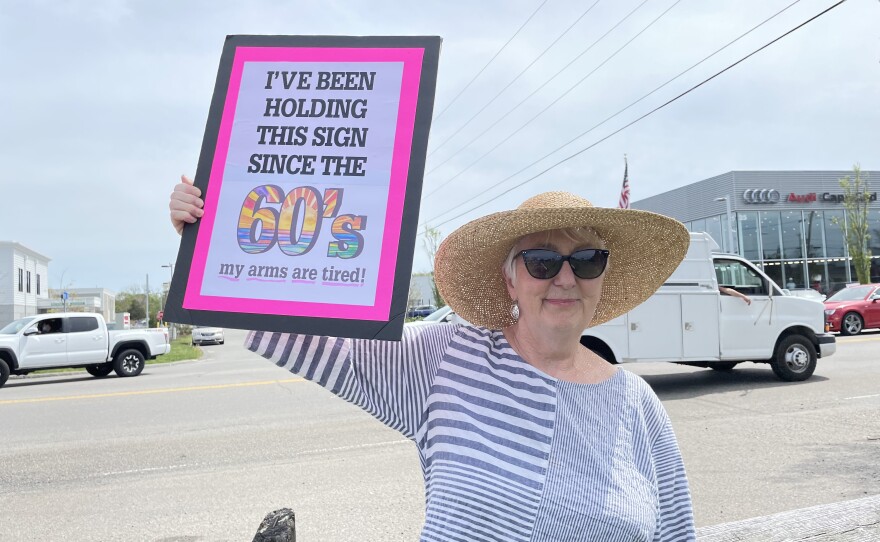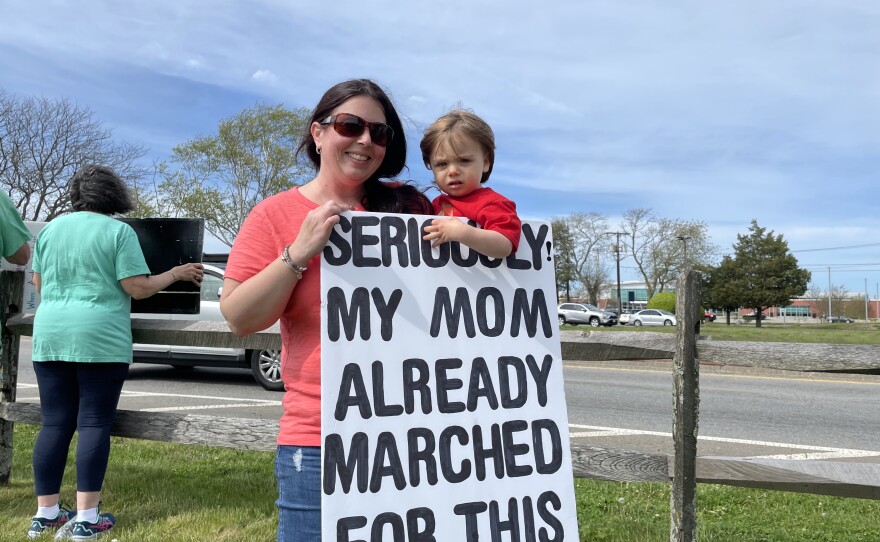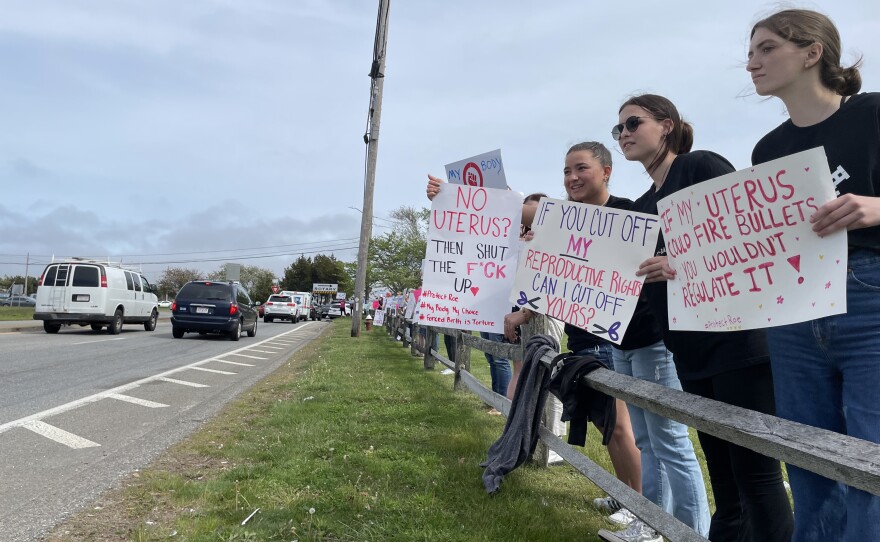Anger, fear and hope were shared at pro-choice rallies across the region on Saturday as hundreds gathered to speak out against a leaked draft of a Supreme Court opinion that would overturn Roe v. Wade.
In Hyannis, many of the nearly 200 pro-choice activists who assembled by the Airport Rotary said they were furious about the potential reversal of the 49-year-old landmark abortion rights case.
Men, women and children held signs that read: “My body my choice,” “Against abortion? Don’t have one,” “I can’t believe we’re still fighting this,” and “Now you pissed off Grandma.”
No anti-abortion activists counter-protested at the rally, but some passersby shouted obscenities and accused activists of being “baby killers.”
The majority of feedback was positive, with many drivers waving, honking and cheering during the two-hour, peaceful event. No police presence was required.
Bans Off Our Bodies rallies took place Saturday across the United States, from Arizona to West Virginia, from Hawaii, to Alaska. Planned Parenthood reported over 1 million people gathered at 450 events nationwide.
Locally, rallies were planned for Wareham, Tisbury, Orleans, Falmouth, Hyannis and at least seven other Massachusetts communities.
Many in attendance at the Hyannis rally said they were scared for the future, but more said they were angry.
“I’m trying to laugh. I’m trying to have a good time, but I am furious because, as a sign says over there, ‘I don’t believe I have to do this again,’” said Anca Vlasopolos, 73, of Centerville. She remembered what life was like living in Michigan in the 1970s before access to legal abortions.
“I remember when my friends had to go to New York to get abortions. And for some of them, it was excruciating because they had to beg,” she said. “We used to have bake sales to raise funds to send them to New York to get an abortion. It was simply appalling.”
On January 22, 1973, the Supreme Court issued a 7–2 decision that found women in the United States had a fundamental right to choose whether to have abortions without excessive government restriction. Vlasopolos said she was in a car when the news broke.
“I had to pull over because I wept for joy. I was so relieved. I was a young woman. I was married. I intended to have children, but on my terms, when I was ready for them,” she said. “I remember that afternoon when the decision came down it was one of the most moving things in my life, saying, ‘Finally, progress in this country.’”
Other women at the rally shared similar stories.
“I had roommates in college who had abortions with coat hangers and then went to their little doctors and said, ‘Gee, I need antibiotics,’” said Susan Guill. “And if they hadn’t been middle-class women, they would have died. They were the lucky ones.”
Younger women — including teens in attendance — said overturning legal protections for abortion could trigger a return to the scenario Guill described.
“When you get rid of Roe v. Wade, you’re not stopping abortions. You’re only stopping safe ones,” said Summer Nickerson, a high school student at Sturgis West.
“I’m angry for everybody this affects,” she added. “This is about my sister. It’s about my friends. It’s about people that I know who are mentally ill and … wouldn’t be able to support a child or even to support a pregnancy.”
If Roe v. Wade were overturned, at least 26 states are "certain or likely" to ban abortions, which, Planned Parenthood says, would leave more than 36 million women of reproductive age — and other people who can become pregnant — without abortion access. Massachusetts, which protects the right to abortion under state law, is not among those states.
Mothers in the crowd of protesters, who knew the challenges and intimacies of sustaining a pregnancy and giving birth, said that fact offered little comfort.
“I’m so lucky to be a mom. I wouldn’t trade that for anything, but that was my decision and I hope that everyone else can make that decision for themselves,” said Erin Andrews, organizer of the event. “I think everyone’s here for that reason, too: your body is your body.”
Kelly Buckley, who held her toddler son Leo in her arms for much of the rally, agreed.
“I made a choice and everybody else should make the choice that works for them. And hopefully someday, if he’s raised properly, which I think he will be,” she said with a laugh, “he’ll agree.
Mairead Reddin, who carried a sign that read, “I’ve been holding this since the 60’s, my arm is tired,” went a step further. She said she was protesting for her daughter’s right to choose.
“If she ever finds herself in that position that she doesn’t want to hang onto a pregnancy [because] it’s not the right time, I would hope she has the freedom to get taken care of, and live through it.”
Intense emotions swirled throughout the afternoon, but activist Ashley Granger said the emotion that pushed her to protest on Saturday wasn’t fear or anger, but hope.
“Mobilization of women all across the country will show people how angry we are,” she said, “because I think they underestimate that.”
The Supreme Court is expected to issue its ruling on abortion rights in June. Before and after that decision is announced, Andrews said, action is needed.
“I want people to leave here today feeling a sense of hope, but also a sense of purpose,” she said. “Hope isn’t going to get us through anything. It’s what we do with that.”











